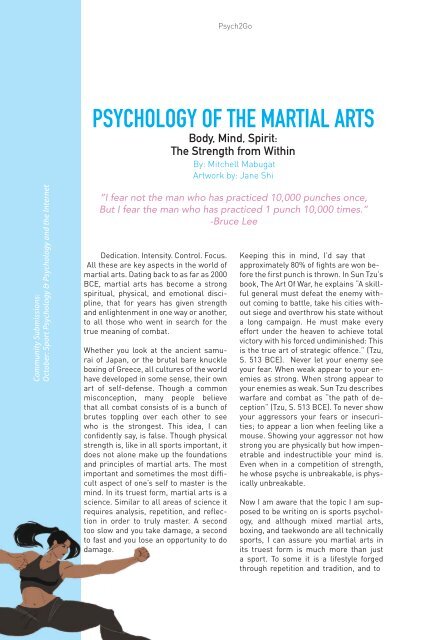PSYCH2GO-HQ-Pages
You also want an ePaper? Increase the reach of your titles
YUMPU automatically turns print PDFs into web optimized ePapers that Google loves.
Psych2Go<br />
46<br />
PSYCHOLOGY OF THE MARTIAL ARTS<br />
Body, Mind, Spirit:<br />
The Strength from Within<br />
By: Mitchell Mabugat<br />
Artwork by: Jane Shi<br />
Community Submissions:<br />
October: Sport Psychology & Psychology and the Internet<br />
“I fear not the man who has practiced 10,000 punches once,<br />
But I fear the man who has practiced 1 punch 10,000 times.”<br />
-Bruce Lee<br />
Dedication. Intensity. Control. Focus.<br />
All these are key aspects in the world of<br />
martial arts. Dating back to as far as 2000<br />
BCE, martial arts has become a strong<br />
spiritual, physical, and emotional discipline,<br />
that for years has given strength<br />
and enlightenment in one way or another,<br />
to all those who went in search for the<br />
true meaning of combat.<br />
Whether you look at the ancient samurai<br />
of Japan, or the brutal bare knuckle<br />
boxing of Greece, all cultures of the world<br />
have developed in some sense, their own<br />
art of self-defense. Though a common<br />
misconception, many people believe<br />
that all combat consists of is a bunch of<br />
brutes toppling over each other to see<br />
who is the strongest. This idea, I can<br />
confidently say, is false. Though physical<br />
strength is, like in all sports important, it<br />
does not alone make up the foundations<br />
and principles of martial arts. The most<br />
important and sometimes the most difficult<br />
aspect of one’s self to master is the<br />
mind. In its truest form, martial arts is a<br />
science. Similar to all areas of science it<br />
requires analysis, repetition, and reflection<br />
in order to truly master. A second<br />
too slow and you take damage, a second<br />
to fast and you lose an opportunity to do<br />
damage.<br />
Keeping this in mind, I’d say that<br />
approximately 80% of fights are won before<br />
the first punch is thrown. In Sun Tzu’s<br />
book, The Art Of War, he explains “A skillful<br />
general must defeat the enemy without<br />
coming to battle, take his cities without<br />
siege and overthrow his state without<br />
a long campaign. He must make every<br />
effort under the heaven to achieve total<br />
victory with his forced undiminished: This<br />
is the true art of strategic offence.” (Tzu,<br />
S. 513 BCE). Never let your enemy see<br />
your fear. When weak appear to your enemies<br />
as strong. When strong appear to<br />
your enemies as weak. Sun Tzu describes<br />
warfare and combat as “the path of deception”<br />
(Tzu, S. 513 BCE). To never show<br />
your aggressors your fears or insecurities;<br />
to appear a lion when feeling like a<br />
mouse. Showing your aggressor not how<br />
strong you are physically but how impenetrable<br />
and indestructible your mind is.<br />
Even when in a competition of strength,<br />
he whose psyche is unbreakable, is physically<br />
unbreakable.<br />
Now I am aware that the topic I am supposed<br />
to be writing on is sports psychology,<br />
and although mixed martial arts,<br />
boxing, and taekwondo are all technically<br />
sports, I can assure you martial arts in<br />
its truest form is much more than just<br />
a sport. To some it is a lifestyle forged<br />
through repetition and tradition, and to


